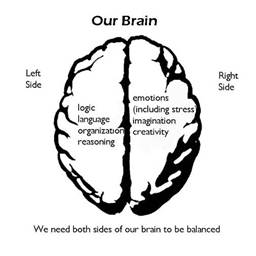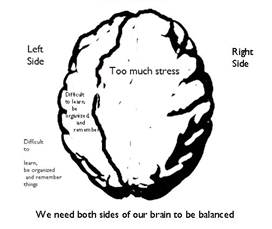Stress, trauma and the Brain
 While the healthy body can restore itself quickly after a stressful incident (running for a late bus, facing an important examination), this is not the case with long term stress overload. Chronic (toxic) stress causes the brain to secrete an excess of hormones, such as cortisol. Excessive secretion of cortisol interferes with memory, retention, focus, and learning. As a result of experiencing extreme traumatic stress over time, the hippocampus—the part of the brain responsible for learning new things—can become damaged. In addition, an overload of stress can cause an imbalance in the functioning of the brain’s hemispheres. When we feel healthy, centered, and balanced, both hemispheres of the brain work well together. When we are excessively depressed, anxious, and stressed, the right hemisphere becomes dominant. This interferes with cognition, self-regulation, and the ability to focus and remember. While the healthy body can restore itself quickly after a stressful incident (running for a late bus, facing an important examination), this is not the case with long term stress overload. Chronic (toxic) stress causes the brain to secrete an excess of hormones, such as cortisol. Excessive secretion of cortisol interferes with memory, retention, focus, and learning. As a result of experiencing extreme traumatic stress over time, the hippocampus—the part of the brain responsible for learning new things—can become damaged. In addition, an overload of stress can cause an imbalance in the functioning of the brain’s hemispheres. When we feel healthy, centered, and balanced, both hemispheres of the brain work well together. When we are excessively depressed, anxious, and stressed, the right hemisphere becomes dominant. This interferes with cognition, self-regulation, and the ability to focus and remember.
 While ABE teachers do not need to study neuroscience in depth, understanding the relationship between chronic stress, trauma, and learning can help inform our practice and help students understand some of the things that might be getting in the way of their progress. While ABE teachers do not need to study neuroscience in depth, understanding the relationship between chronic stress, trauma, and learning can help inform our practice and help students understand some of the things that might be getting in the way of their progress.
Please check out the Mind and the Body section of our website, particularly for resources on Brain Gym, a series of exercises involving cross lateral movements that purport to promote more balanced neural connections between both sides of the brain, enhancing concentration, focus, cognition and a sense of well-being. Our Resources page offers a bibliography for further reading.
For an experiential exercise illustrating how the brain hemispheres work, see Right Side Left Side Brain Conflict. For lesson plans, see Alice Nelson's Right Side Left Side Brain Questions and Right Brain or Left Brain?
Two useful videos on the brain and stress include:
|



 While ABE teachers do not need to study neuroscience in depth, understanding the relationship between chronic stress, trauma, and learning can help inform our practice and help students understand some of the things that might be getting in the way of their progress.
While ABE teachers do not need to study neuroscience in depth, understanding the relationship between chronic stress, trauma, and learning can help inform our practice and help students understand some of the things that might be getting in the way of their progress.